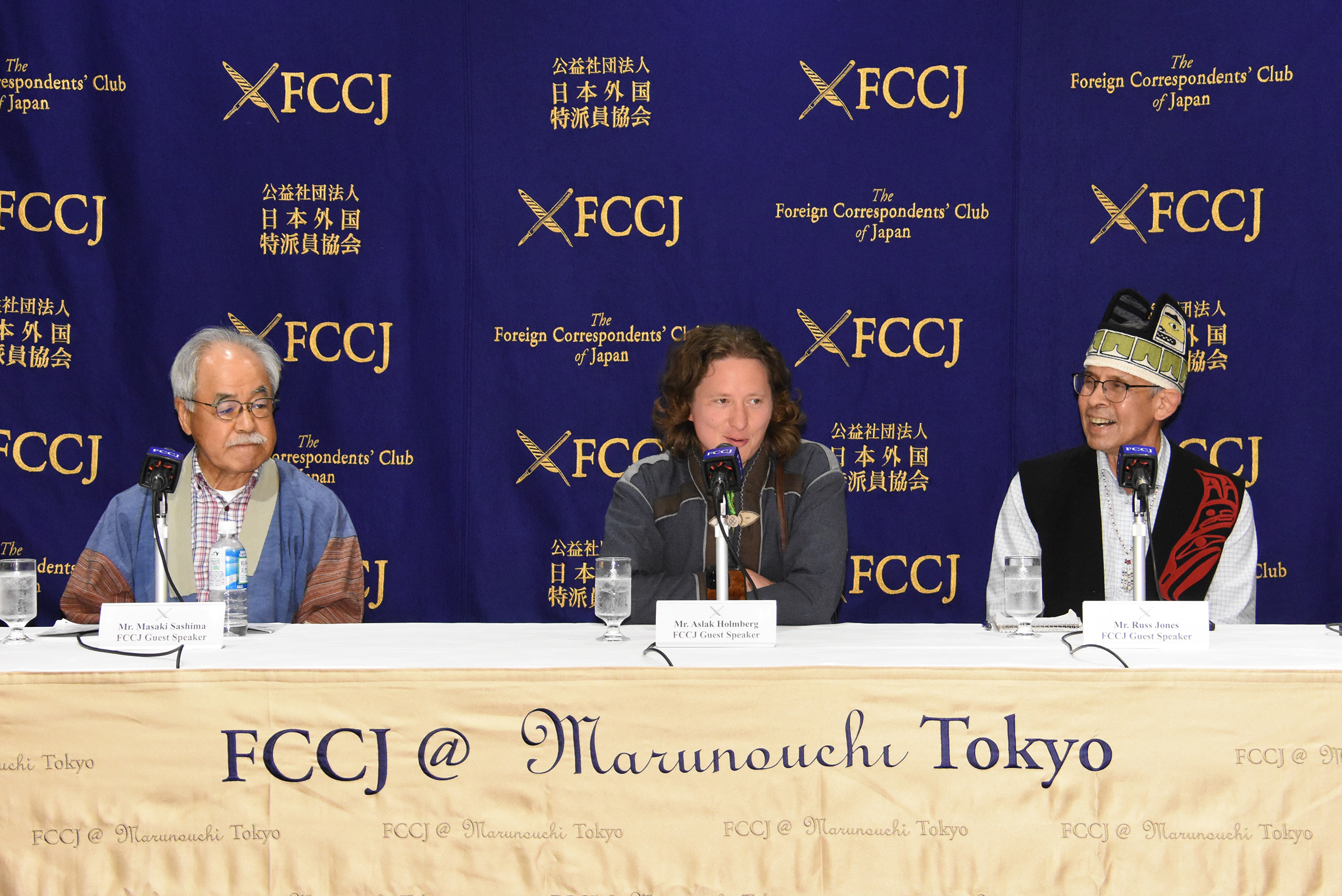Issue:
July 2023 | Letter from Hokkaido
Landmark lawsuit on Ainu fishing rights could open legal floodgates

At the end of May, three representatives of indigenous peoples came to the FCCJ to address a question with immediate relevance for Hokkaido, but which also has deep national and international implications: salmon fishing rights.
They included Masaki Sashima, representing the Raporo Ainu Nation in central Hokkaido, who is involved in a landmark lawsuit against the central government and Hokkaido prefectural government to regain the group's inherent fishing rights for commercial, not cultural, purposes.
When Japan passed the Ainu Promotion Act in 2019 – more than 10 years after a resolution recognized the Ainu as Japan’s indigenous people – bureaucrats in Tokyo probably hoped that would be the final word on the saga of the Ainu’s struggle to be officially recognized.
But in the small central Hokkaido town of Urahoro, Sashima and members of the Raporo Ainu Nation were angry – not only at the salmon fishing ban for anything other than what the central and Hokkaido governments approved as limited catches for “cultural” reasons, but also because the government, not the Ainu, got to define what constituted “cultural”.
In August 2020, they filed a lawsuit at the Sapporo district court claiming that, as descendants of Ainu who lived in the area during the Edo Period (1603-1867) and caught salmon in local rivers for commercial purposes, they have an inherited right to fish for commercial reasons.
Sashima and the Raporo Ainu Nation argue that the ban on catching salmon has no legal grounds, and that they have the right to catch salmon in the mouth of the Urahorotokachi River. To support their argument, they point to the UN Rights of the Indigenous Peoples adopted in 2007, which Japan voted for. The declaration notes that indigenous peoples have the right to the lands, territories and resources they have traditionally owned, occupied or otherwise used or acquired.
The lawsuit continues to wind its way through the legal system, and Sashima said he had no idea when a final decision is due. If they lose, they might appeal. If it ends up in the supreme court, a final ruling could be many years away.
It is a complex case that has caused consternation among judicial officials.
“The first judge assigned to our case said that neither the national government nor the Hokkaido government was clear about whether Ainu people freely fished for salmon and hunted deer prior to the Meiji period,” Sashima said. “He appealed to both the central and local governments for an answer.”
After the first judge was replaced, the second gave the Raporo Ainu Nation reason to be concerned about their chances of getting a fair hearing, prompting them to take their case to the international community, including the FCCJ.
The central and Hokkaido governments have refused to comment publicly while the case is being heard. The legal complications stem from the need to establish proof that the Raporo Ainu Nation has, indeed, lived in the Urahoro area for as long as they say they have. In 1899, the Meiji government - without consultation – forced the Ainu into “reservations” to control the use of agricultural land. Many Ainu villages in Hokkaido were, in fact, created not by the Ainu themselves but by bureaucrats in Tokyo. The Raporo Ainu Nation says its people were there before the Meiji laws were imposed on them.
The potential political implications of the lawsuit could be even more daunting for the Japanese government.
“We, the plaintiffs, are not seeking the right to catch salmon as an individual Ainu right, but as a collective right of the Ainu as a group,” Sashima said at the FCCJ event.
That means if they win their case – meaning the Japanese government agrees they have a collective right to fish for salmon for commercial reasons – it could upend the way fishing unions have long operated in Hokkaido. A slew of similar lawsuits from other Ainu groups near Hokkaido’s rivers could follow. Hokkaido’s powerful fishing unions, and the politicians and bureaucrats they support and who pass ordinances and laws on their behalf, would suddenly find their longstanding, monopolistic control of prime fishing grounds being eroded.
In addition, an acknowledgment by the court that Ainu have an inherent collective right to fish for salmon would open the door to future lawsuits from other Ainu groups who demand, for example, collective, inherent hunting or farming rights on land held by individuals and corporations, or which has been set aside as locally or nationally administered parks or is located near the sites of sensitive facilities, such as military bases and power plants. A seemingly endless stream of lawsuits in Hokkaido from those claiming in inherent fishing and hunting rights would be a nightmare for the local and national governments.
The worst-case scenario for the Ainu would be a court ruling that clearly denies them their rights or a fudged verdict that muddies the waters enough to continue the status quo.
The Raporo Ainu Nation lawsuit is crucial because it poses a fundamental legal and moral question that will set important precedents: what do inherent indigenous rights in Japan look like in practice, not just in speeches made in the Diet or at international conferences on indigenous rights?
The Raporo Ainu, the rest of Japan, and the world, are waiting for an answer.
Eric Johnston is the Senior National Correspondent for the Japan Times. Views expressed within are his own and do not necessarily reflect those of the Japan Times.

